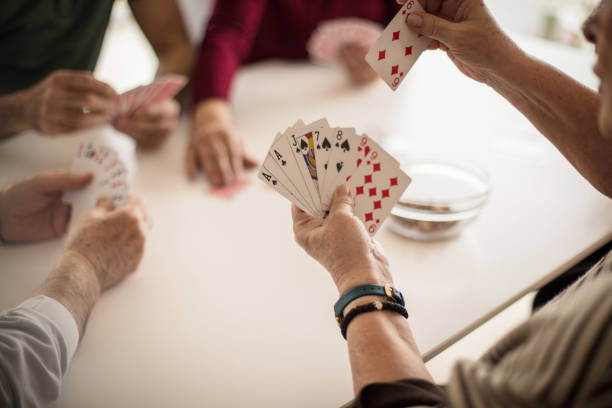Games are more than just a pastime—they’re a way to connect, engage the mind, and spark joy at any age. For seniors, especially, the right board or card game can offer social interaction, mental stimulation, and simple fun in a relaxed and welcoming setting. Whether it’s playing with family, bonding with new friends in a retirement community, or challenging a longtime partner over coffee, classic and modern games remain beloved.
In this blog, we’ll explore a curated list of favorite board and card games that are especially well-suited for older adults, considering accessibility, enjoyment, and brain benefits.
Why Games Matter in Senior Living
Playing games is not just about killing time—it can be a powerful tool for maintaining cognitive health. Research shows that mentally stimulating activities, like strategic or memory-based games, help maintain focus, memory, and problem-solving skills. For seniors, regularly playing games can also reduce feelings of loneliness and depression, especially when group play is encouraged.
Many board and card games are easily adapted for players with vision issues, arthritis, or memory impairments. Large print cards, simplified rules, and cooperative gameplay can make all the difference.
Classic Card Games with Lasting Appeal
Bridge
Bridge continues to be a favorite in senior communities for its strategic depth and social nature. It’s a four-player game that challenges memory, logic, and teamwork. While the learning curve can be steep for beginners, it’s highly rewarding and often played in clubs or small weekly gatherings.
Rummy
Simple to learn but endlessly engaging, Rummy is a game of sets and sequences that promotes pattern recognition and planning. It’s ideal for two to six players and can be customized with house rules to keep things fresh.
Solitaire
For those who enjoy a solo challenge, classic Solitaire never gets old. Whether it’s the physical card version or a digital one on a tablet, this timeless game improves concentration and hand-eye coordination.
UNO
Although newer compared to other classics, Uno is hugely popular among all age groups. It’s easy to pick up, colorful, and encourages laughter and interaction. With bold colors and minimal text, it’s accessible even for those with mild vision difficulties.
Beloved Board Games that Stand the Test of Time
Scrabble
Scrabble is a perfect choice for word lovers. It stimulates vocabulary and cognitive skills and can be played at a leisurely pace. The game fosters both competitive and collaborative atmospheres and is often a favorite in intergenerational settings.
Checkers and Chess
These two classics offer vastly different experiences. Checkers is approachable and quick to learn, while Chess is a game of strategy and foresight. Both improve logical thinking and can be enjoyed with standard or larger pieces for accessibility.
Monopoly
Monopoly can be a delightful trip down memory lane, especially for seniors who played it with their children or grandchildren. The game encourages negotiation, money management, and long-term planning, making it both educational and entertaining.
Trivial Pursuit
For seniors with a love for knowledge and trivia, Trivial Pursuit is a hit. With editions ranging from general knowledge to decade-specific trivia, it’s a fun way to reminisce and flex memory muscles. The team-play format also makes it great for group settings.
Games with Cooperative and Social Focus

Bingo
It’s impossible to talk about games for seniors without mentioning Bingo. Its popularity in senior centers is well-earned—it’s inclusive, high-energy, and relies on chance rather than skill, making it accessible to all ability levels. Plus, it’s a great social event that often includes prizes and laughter.
Dominoes
Dominoes offers both calm and competition. Variations like Mexican Train are especially popular in group play. The tactile nature of the pieces makes them ideal for seniors with limited dexterity, and gameplay encourages strategic thinking.
Sequence
This hybrid game combines cards and a game board and is easy to learn yet satisfying to play. The objective is to form sequences of chips on the board, which adds a visual and spatial element that appeals to different types of thinkers.
Adapting Games for Accessibility
Game enjoyment shouldn’t be limited by physical or cognitive challenges. Fortunately, many companies now offer senior-friendly editions of popular games. These may include:
- Large print playing cards
- Tactile game pieces for the visually impaired
- Simplified rulebooks
- Games with shorter durations or turn-based formats
Introducing these adaptations ensures that every senior can continue to enjoy their favorite games without frustration.
The Social Value of Shared Play
Games have a unique ability to break down social barriers. In senior communities, they often serve as icebreakers that help residents bond more quickly. Regular game nights or tournaments can foster new friendships and give structure to daily routines.
Family members and caregivers can also use game time as an opportunity to connect. Whether it’s a Saturday afternoon Scrabble match or a casual game of Uno after dinner, these moments become memories and traditions.
Final Thoughts
Games are timeless, ageless, and joyfully universal. For seniors, they serve not only as entertainment but also as tools for cognitive engagement, emotional wellness, and social connection. With the wide variety of board and card games available today—both classic and contemporary—it’s easy to find the perfect fit for every personality and preference.
Whether it’s the quiet intensity of Solitaire, the strategic thrill of Bridge, or the communal cheer of Bingo, every game brings something valuable to the table.


Recent Comments